I attended the 2025 Senior Colloquium in February and heard senior Lisi Chapin speak about how the Dolmen Collection in Special Collections & Archives inspired her. I invited her to contribute a blog post about her experiences which reminds us of how broad-ranging the impact of archives can be.
Here is some more about Lisi, who is also a ZSR Ambassador:
Hi! My name is Lisi Chapin, and I am a Senior from Easton, Connecticut. I am double majoring in Communications and Spanish. Outside of being a ZSR ambassador, I work in Benson University Center, play soccer for the club team here, and I’m the intramural sports chair for Kappa Delta sorority. My favorite activity to do at Wake is to walk the Reynolda trail. I think everyone should explore all the levels of ZSR. The library might look packed with no available space, but there are always some great studying spots in hidden corners of the library!
By Lisi Chapin (’25)
I first came across the Dolmen Press in my class on Irish Women in Film and Literature with Professor Balzano. I thought that the class sounded interesting, and I needed some more credit hours, so I decided to enroll in it. Suddenly I was immersed into a world of Irish poetry, books, movies, and history and I immediately fell in love. My first time reading the Dolmen Press was during an in-class field trip to ZSR’s Special Collections & Archives (SCA). I was able to touch with my own hands these amazing pieces of art and literature that you would normally see in a museum. After that first encounter, I kept going back to the Special Collections and reading more of the Dolmen Press, specifically work by women. Megan Mulder, who works in SCA was helpful on this journey and would talk with me about different collections of the Dolmen Press and various aspects that caught her eye.
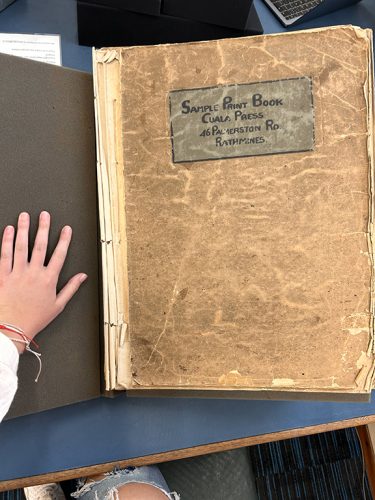
Throughout my time in this class I learned all about Ireland’s history, and something that stuck out to me was The Magdalene Laundries. These convents were run by Roman Catholic orders and would house “fallen women.” Fallen women could mean anything from an unmarried pregnant woman to a woman deemed promiscuous. The Magdalene Laundries claimed they were helping these “fallen women,” but the truth was that these women were oppressed, abused, and killed; having their babies taken from them and put up for adoption. There have been over 1600 known deaths of the Magdalene women and every few years they uncover more unmarked graves.
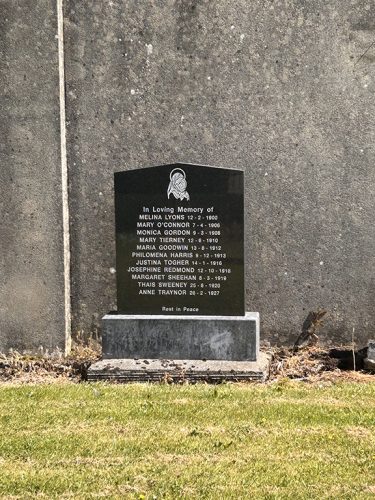
Although this is a terribly surprising truth, this is not what caught my eye and made me think there may be more to investigate here. We can look in almost any history book and see female oppression riddled throughout a nation’s history. What truly surprised me is that the last Magdalene Laundry closed in 1994, which is only 9 years before I was born. What shocked me even more was that very few people knew about the Magdalene Laundries unless you were living in Ireland at the time, even then, very few knew about the actual abuse that went on behind their doors. My friends, parents, teachers, and grandparents have never heard of such a place. Even when I researched the Magdalene Laundries to find out more about their dark history, I could not find much information, and most of what I could find was written from a male perspective. I was upset that I could not read a woman’s perspective on this time in Ireland’s history, and that is when it hit me. The Dolmen Press published women during a time (1951-1987) where it was rare to see a woman’s work printed. This was also during the period of the Magdalene Laundries. I had found my missing link of history, hidden behind the poetry, art, and literature of the female creators of the Dolmen Press (please see the SCA blog for more about the Dolmen and its artists). With the help of Professor Balzano and Megan Mulder, I earned the Richter Scholarship to go to Ireland and research the Dolmen Press and the Magdalene Laundries.

In Ireland I went all over to find pieces of the Dolmen Press finding success in The National Library of Ireland and in the library at Trinity College. I finally discovered female expression during this time. One piece that stood out to me was 159 Maxims, by Diana Tomkin. This was a clear sign to me that women will not forget the injustice done to them, even if they are silenced, they will find any way to spread their message.
“It is a wonderful virtue to be able to forget; how much happier we are and everyone else also if we can only forget. The trouble with the average woman is that she is like an elephant in that she never forgets” (Diana Tomkin, 159 Maxims)
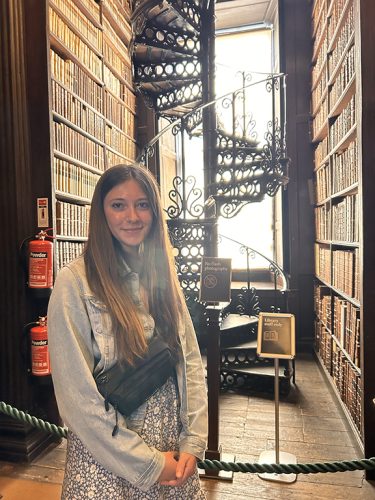
I traveled around Ireland visiting the Magdalene Laundries, finding that they are very well hidden or even converted into new housing or hospitals. Most of them I had to walk by multiple times before realizing I had arrived at my destinations because they were unmarked. It is a dark side of history, and one thing humans seem to love more than anything, is erasing all the evidence of that. What I discovered during my time researching the Dolmen Press is something that I will never forget and take with me wherever I go. It has taught me to look closer into history and think about the perspective of the author. The male perspective of the Magdalene Laundries was quite different from the female perspective, and changes how we view a nation’s history.
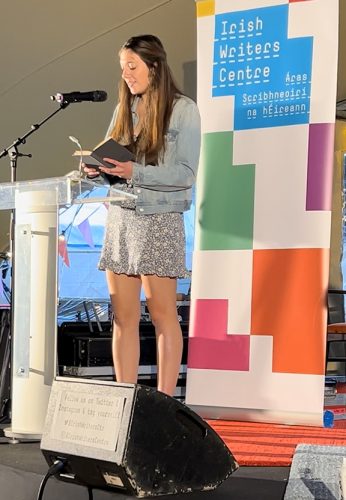
Researching the Dolmen Press was an amazing experience, and from time to time, I still go back and read notes and pictures I took of the Press. Although next year I will be living in Wisconsin working for Epic Systems, far away from the scattered Dolmen Collections, I wager that I will still look back fondly at all the evidence, art, and literature I gathered.
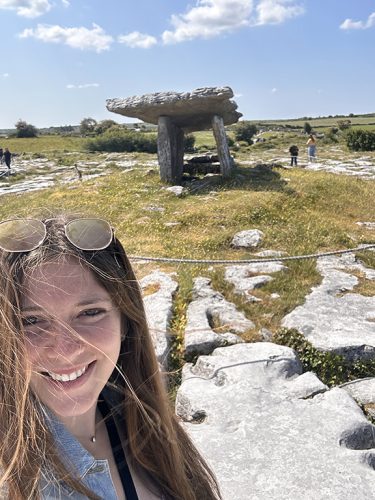

7 Comments on ‘Guest Blog Post by Senior Lisi Chapin (’25)’
Amazing experiences, thanks for sharing!
Thank you for sharing your experience. And thank you for highlighting our collections!
Fantastic post, Lisi! Thank you so much for helping us appreciate the Dolmen collection, and for teaching us about Magdalene Laundries. Sad and fascinating!
This is wonderful reporting on the Dolmen Press! What a unique opportunity to be able to explore the Dolmen Press in Ireland and see this wonderful material first hand. Thanks.
“This was a clear sign to me that women will not forget the injustice done to them, even if they are silenced, they will find any way to spread their message.” A student connecting the dots is one of the most gratifying things a teacher will ever experience. Going from considering a class that looked interesting to immersing herself in exploration of its topics, Lisi exemplifies what we all hope college unlocks in a person. Go be great, Lisi!
It is amazing how one introduction can take a person on a most interesting journey! How cool that it was a library encounter that sparked such a journey for Lisi. Thank you for telling us about your experience and sharing your pictures, Lisi.
Great post! I really enjoyed the way you explained the topic—it was clear, informative, and easy to follow. Thanks for sharing your insights. Looking forward to reading more from you!
stitch angel backpack